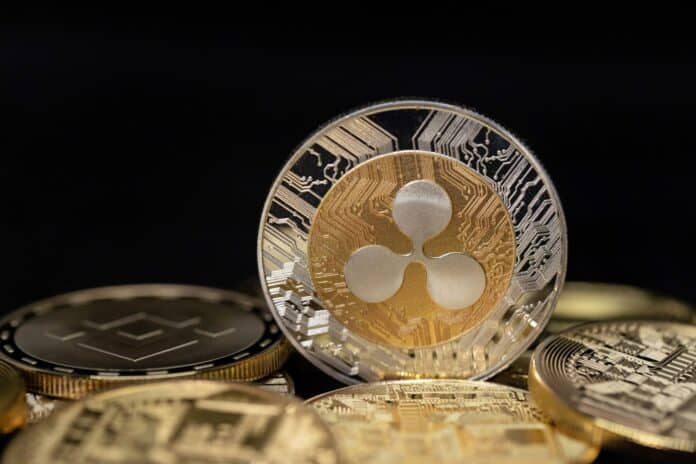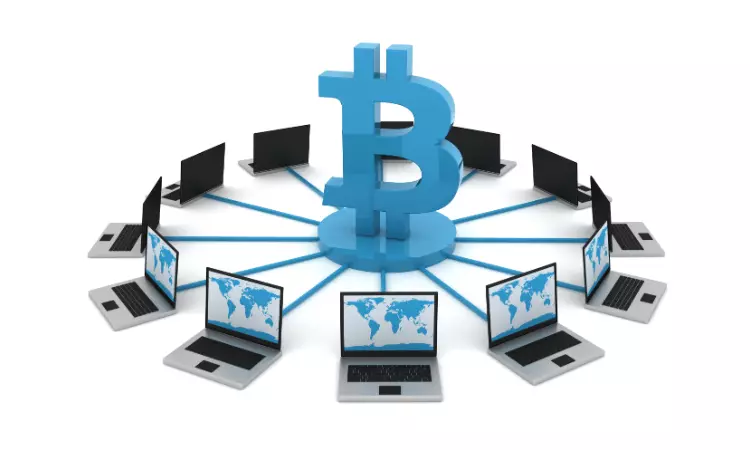In the ever-evolving landscape of cryptocurrency and blockchain technology, Ripple has emerged as a noteworthy player, capturing the attention of both seasoned investors and newcomers alike.
But what exactly is Ripple, and why has it generated such significant buzz in the world of digital assets?
In this comprehensive article, we will delve into the intricacies of Ripple, exploring its origins, core technology, unique features, and its potential impact on the financial industry.
Whether you’re a seasoned cryptocurrency enthusiast or someone just beginning to explore the world of blockchain technology, this article will provide you with a clear understanding of Ripple and its potential to reshape global transactions as we know them.
What Is Ripple?
Ripple is a blockchain-based digital payment protocol and cryptocurrency designed to facilitate fast and low-cost cross-border transactions.
It was created in 2012 by Chris Larsen and Jed McCaleb and is often referred to as XRP, which is its native cryptocurrency.
Ripple’s primary goal is to enable efficient international money transfers by bypassing traditional banking systems, which can be slow and expensive.
Unlike other cryptocurrencies like Bitcoin, which rely on a decentralized network of miners, Ripple operates on a more centralized system.
It utilizes a consensus algorithm to validate transactions, making it faster and more scalable.
This approach has made Ripple attractive to financial institutions and payment providers looking to streamline their cross-border payment processes.
Ripple’s technology and cryptocurrency have gained attention for their potential to revolutionize global finance and cross-border payments.
However, it has also faced regulatory challenges and debates about its centralization, which continue to shape its future in the financial industry.
The Origins And History Of Ripple.
Ripple’s journey began against the backdrop of the rising wave of cryptocurrencies in the early 2010s.
Unlike many other cryptocurrencies, Ripple didn’t emerge from the mysterious Satoshi Nakamoto; instead, it had a clear organizational origin.
Launched in 2012 by Ripple Labs, the company aimed to create a more efficient and cost-effective global payment system.
Its founders, Chris Larsen and Jed McCaleb, envisioned a blockchain-based solution that would enable financial institutions to transfer value across borders seamlessly.
As Ripple gained traction, it attracted significant investments from venture capitalists and established itself as a unique player in the cryptocurrency space.
Its development team continuously improved the protocol, refining its features and expanding its capabilities.
This evolution marked the beginning of Ripple’s journey towards reshaping the world of cross-border payments and digital finance.
How Ripple Works?
At its core, Ripple operates on a decentralized network of servers and validators.
The Ripple protocol, known as the Ripple Transaction Protocol (RTXP), is designed to enable the transfer of both digital and traditional currencies.
Central to Ripple’s functionality is the cryptocurrency XRP, which serves as a bridge between different currencies, facilitating the frictionless exchange of value.
One of the distinguishing features of Ripple is its consensus mechanism.
Unlike the energy-intensive Proof of Work (PoW) mechanism used by Bitcoin, Ripple employs a more environmentally friendly consensus protocol called the Ripple Protocol Consensus Algorithm (RPCA).
This consensus mechanism allows for faster transaction confirmation times, making Ripple an attractive option for financial institutions and individuals seeking efficient cross-border payments.
Validators and gateways play a crucial role in the Ripple network.
Validators confirm transactions and maintain the ledger, ensuring its integrity.
Gateways act as entry and exit points for assets, bridging the gap between the Ripple network and traditional financial systems.
This unique architecture sets Ripple apart from many other cryptocurrencies and positions it as a potential disruptor in the financial industry.
Use Cases And Applications.
Ripple’s value proposition lies in its versatility and adaptability to various financial use cases.
One of its primary applications is in the realm of cross-border payments.
Traditional international money transfers can be slow and costly due to intermediary banks and multiple currency conversions.
Ripple’s technology streamlines this process, allowing financial institutions to settle cross-border payments in a matter of seconds, with significantly reduced fees.
Additionally, Ripple’s network can be utilized for digital asset exchange.
This capability enables users to trade a wide range of assets, including cryptocurrencies, fiat currencies, commodities, and even digital representations of real-world assets like stocks.
Ripple’s speed and efficiency make it an attractive option for traders seeking rapid execution of orders.
Moreover, financial institutions and banks are increasingly exploring Ripple as a solution for improving their own operations.
By integrating Ripple’s technology, banks can enhance their cross-border payment services, reduce costs, and provide their customers with faster and more reliable transactions.
This has the potential to revolutionize the banking industry’s approach to international remittances and settlements.
Key Features Of Ripple.
Ripple’s adoption and recognition are further driven by its standout features, which address critical pain points in the world of finance.
Speed and scalability are two of its most notable attributes.
Unlike Bitcoin’s PoW system, which can result in slow transaction processing times during periods of high demand, Ripple’s RPCA allows for rapid transaction confirmations, making it suitable for real-time payments and settlements.
Security and reliability are paramount in the financial industry, and Ripple doesn’t compromise on these fronts.
The consensus mechanism and robust network of validators ensure the integrity of transactions and the overall stability of the Ripple ledger.
This reliability is especially appealing to financial institutions that require a trusted infrastructure for their operations.
Cost-efficiency is another significant advantage of Ripple.
Traditional cross-border transactions can incur substantial fees, including conversion costs and intermediary bank charges.
Ripple’s direct peer-to-peer approach minimizes these expenses, making it an attractive option for individuals and institutions looking to reduce the financial burden associated with international payments.
Transparency is a core principle of blockchain technology, and Ripple is no exception.
The Ripple ledger is publicly accessible, allowing anyone to view and verify transactions.
This transparency enhances trust and accountability, especially in an industry that has faced its fair share of skepticism and mistrust.
Ripple VS Other Cryptocurrencies.
Comparing Ripple to other prominent cryptocurrencies like Bitcoin and Ethereum provides valuable insights into its unique positioning in the digital finance landscape.
Unlike Bitcoin, which primarily serves as a store of value and a medium of exchange, Ripple focuses on facilitating efficient and cost-effective transactions.
While Bitcoin’s PoW mechanism has its advantages, Ripple’s RPCA offers a more energy-efficient and faster alternative, particularly suited for the financial sector.
Ethereum, with its smart contract capabilities, caters to a different set of use cases compared to Ripple.
However, Ripple’s emphasis on cross-border payments and its partnerships with financial institutions make it a more specialized solution for the finance industry.
In terms of market position, Ripple has consistently ranked among the top cryptocurrencies by market capitalization.
Its ability to address real-world financial challenges has contributed to its steady presence in the crypto market and its relevance in discussions about the future of finance.
Regulatory Challenges And Controversies.
While Ripple has made significant strides in the financial industry, it has not been without its share of challenges.
One of the most notable events in Ripple’s history is the lawsuit filed by the U.S.
Securities and Exchange Commission (SEC) against Ripple Labs in December 2020.
The SEC alleged that XRP, Ripple’s native cryptocurrency, was an unregistered security.
This legal battle sent shockwaves through the cryptocurrency community and raised questions about the regulatory future of Ripple and XRP.
The lawsuit prompted global regulatory responses, with some countries taking a cautious approach to Ripple’s technology and XRP, while others embraced it as a solution for modernizing their financial systems.
The outcome of the SEC lawsuit would ultimately have far-reaching implications for the cryptocurrency industry as a whole and would determine the legal status of XRP.
The lawsuit also had a significant impact on XRP’s market value.
Prices fluctuated dramatically as investors reacted to the uncertainty surrounding the lawsuit’s outcome.
This period of turbulence underscored the interconnectedness of regulatory scrutiny and cryptocurrency market dynamics.
Ripple’s Future Outlook.
As we look ahead, Ripple’s future remains intriguing and full of potential.
The cryptocurrency and blockchain industry is in a constant state of evolution, and Ripple is positioned to play a pivotal role in shaping the future of finance.
Market trends and adoption continue to favor Ripple, especially as more financial institutions recognize the benefits of its technology.
The demand for fast, cost-effective cross-border payments is on the rise, and Ripple is well-equipped to meet this demand.
The potential disruptive impact of Ripple on the finance industry cannot be overstated.
If regulatory hurdles can be overcome, Ripple has the potential to revolutionize the way we conduct international transactions and settlements, making them more accessible, affordable, and efficient for everyone.
However, challenges and risks remain on the horizon.
Regulatory uncertainties, as evidenced by the SEC lawsuit, could pose ongoing challenges for Ripple and the cryptocurrency industry as a whole.
Additionally, competition from other blockchain-based solutions and the need to continually adapt to evolving financial landscapes will be key considerations for Ripple’s future success.
Conclusion.
Ripple represents a transformative force in the world of blockchain technology and digital payments.
Its unique consensus mechanism, speed, and scalability have positioned it as a frontrunner in the quest for more efficient cross-border transactions.
As we’ve explored in this article, understanding Ripple goes beyond the cryptocurrency XRP; it encompasses an entire ecosystem designed to revolutionize the way we transfer value globally.
With financial institutions and businesses increasingly adopting Ripple’s solutions, it’s clear that this technology is here to stay, offering the promise of faster, cheaper, and more accessible international transactions.
As Ripple continues to evolve and adapt to the changing financial landscape, it will undoubtedly play a significant role in shaping the future of finance and ushering in a new era of seamless global payments.







